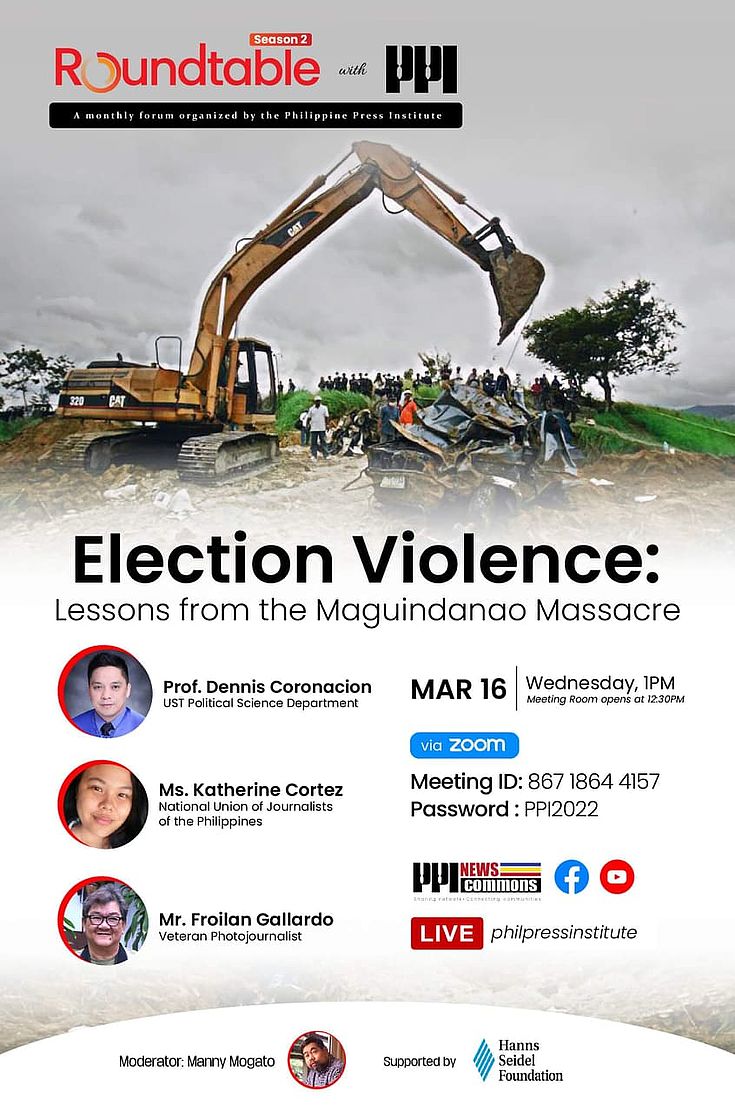Media and Elections
Online Discussion Emphasizes Protection of Journalists in Election Reporting
PPI
How can election violence be avoided? How can journalists covering the election be protected? As the Philippine General Election on 09 May 2022 draws near, the safety and security of journalists in covering elections, from the campaigns until after official results have been announced, is a primary concern in the media community. Said to have underscored the dangers to journalists, especially in elections coverage, the Maguindanao Massacre was reevaluated and the current situation, reassessed for possible safeguards that may be adopted to help ensure the safety of media workers in today’s media landscape.
The political scientist gave an overview of the current political situation and the level of election-related violence in the country; especially, how political clans have maintained their dominance and why. Some of the clans are said to have not only become threats to the country’s political system, but also to many journalists in the field. Two journalists shared their experiences and perspectives in covering ‘bloody’ elections in the provinces. The National Union of Journalists of the Philippines (NUJP) confirmed the holding of a series of safety training activities to help journalists get practical training on how to survive reporting from a hostile environment.
On 23 November 2009, thirty-three media workers – many of them from General Santos City and Koronadal City -- were amongst the fifty-eight persons killed in Ampatuan town, province of Maguindanao. The group was in the convoy to the provincial capitol and included a local politician’s family members on their way to file his certificate of candidacy that was intended to be the subject of the media coverage. The media workers comprised members of the community press as well as radio and television broadcasters. Murder charges were filed and raffled off to a Quezon City Regional Trial Court. As of 2019, of the 188 officially accused, twenty-eight people have been convicted while fifty-six have been acquitted due to reasonable doubt.
It was pointed out that election-related violence is a consequence of the country’s institutional set up, which was described as dating back to the country’s American colonial period. Reasons identified in relation to this included the power bestowed to the executive authority in a unitary system and decentralization, which was determined to have helped empower local governments, in effect, local politicians, who have somehow gained influence in the process, having been proven to be important, not only in providing services to the people, but also in providing support to the national level.
The automation of elections introduced in 2010 was observed to have effectively reduced the opportunity for human intervention, thereby resulting in less political violence during elections. Nevertheless, the identification of risk areas for media workers was stressed as necessary to help prepare them and give them an idea as to what they can expect while doing their coverage.
The reasons why some media workers find themselves reporting from perilous environments unprepared was noted to include the lack of personal protective equipment, which was deemed to be a common situation for journalists in the provinces and in the regions. Another is the limited number of organisations promoting safety awareness of media workers, thus translating to only a limited number of journalists who have acquired knowledge and skills that help them mindfully contemplate safety concerns and related issues. Additionally, the effect of impunity on the journalists’ reporting was also alluded to.
As part of mitigating measures to help media workers avoid ending up in a risky environment, it was recommended that they avail of training, such as those offered by the NUJP. Aside from ethics, these training activities cover both physical and digital safety, so as to increase awareness of journalists who are considered prone to trolling, such as in their personal and in their work-related social media accounts.
As media workers are said to often be subjects of attacks, threats and intimidation, particularly in relation to elections, the speakers underlined the need for training activities for media workers focused particularly on election coverage.
This is the third activity of “Roundtable with PPI” Season 2 series, which debuted in June 2020. Streamed live online, it had 228 unique live viewers, aside from forty-two logged-in participants. Scheduled to be held every third Wednesday of the month, the series tackles current issues deemed to be of pressing concern to the public. This series is organised by the Philippine Press Institute (PPI) with support from the Hanns Seidel Foundation (HSF) as part of their project cooperation on civic journalism.

